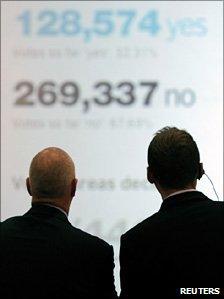Vote 2011: UK rejects alternative vote
- Published

It was clear early on that the No campaign were heading for victory
The UK has voted overwhelmingly to reject changing the way MPs are elected - dealing a bitter blow to Nick Clegg on top of heavy Lib Dem poll losses.
Officials say 19.1m people voted in the second UK-wide referendum in history - a higher than expected turnout of 41%.
The final result put the Yes vote at 32.1% and the No vote at 67.9%.
It comes as the Lib Dems suffered a rout in English local elections - and the SNP scored an historic victory in the Scottish Parliament poll.
Alex Salmond's party will form a majority government- humbling Labour in one of its traditional heartlands and paving the way for a referendum on Scottish independence.
'Clear result'
Labour made significant gains in town halls in the north of England and in the Welsh assembly elections,it fell just short of an absolute majority.
Labour also held Leicester South in a Parliamentary by-election with an increased majority, although the Lib Dems hung on to second place. Sir Peter Soulsby, whose decision to stand down triggered the contest, won the contest to be Leicester mayor.
The Conservatives managed to make significant gains too - with their Lib Dem coalition partners apparently bearing the brunt of public anger over spending cuts at English local elections.
And there was a double blow for Lib Dem leader and deputy prime minister Nick Clegg - who saw his dream of ditching Britain's first-past-the-post electoral system comprehensively dashed.
Mr Clegg said: "I wish I could say this was a photo finish but it isn't, the result is very clear. I'm a passionate supporter of political reform but when the answer is as clear as this, you have got to accept it."
"This is a bitter blow for all those people, like me, who believe in the need for political reform."
The official result of the AV referendum was declared early on Saturday morning.
According to the Electoral Commission, 6,152,607 voted Yes to the Alternative Vote, while 13,013,123 voted No.
'Resounding answer'
Labour leader Ed Miliband - who also backed AV, while many of his own party did not - said he was "disappointed" but the people had "spoken clearly and it's a verdict I accept".
But David Cameron, whose Conservative Party campaigned to keep first-past-the-post, said the referendum had delivered a "resounding answer that settles the question" over electoral change and people now wanted the government to get on with governing in the national interest.
The director of the No campaign, Matthew Elliott, said he had been "astonished" at the scale of the No victory: "I personally believe that this result will settle the debate over changing our electoral system for the next generation."
Mr Clegg told the BBC the Lib Dems were facing "the brunt of the blame" for coalition spending cuts, adding that, for some voters, they were bringing out "memories of things under Thatcher".
He promised to "redouble our efforts" and "get up and dust ourselves down".
BBC political editor Nick Robinson said the order had gone out from Conservative HQ that Tories, who campaigned against their Lib Dem coalition partners over AV, should not be seen gloating.
But he said while there was no serious talk about challenging Mr Clegg's leadership, Mr Clegg was expected to put up more of a fight against his Conservative colleagues so there would be more difficult months ahead for the coalition.
The Lib Dems have lost almost half their councillors whose seats were up for grabs but the Conservatives, who already controlled more councils than all the other parties put together, have increased their number of councillors and gained control of two councils.
In Northern Ireland, The DUP and Sinn Fein are expected to remain the biggest parties in the Northern Ireland Assembly, but there has beencontroversy over the system for counting votes.
The SNP's victory in Scotland is the first time any party has achieved a majority since the 129-seat Scottish Parliament was established in 1999.
Scottish Labour leader Iain Gray said he would stand down in the autumn.
In Wales, Labour won 30 assembly seats, one short of the 31 needed to gain an overall majority.
The Conservatives made gains, but Plaid Cymru and the Lib Dems suffered losses.
- Published20 March 2012
- Published4 May 2011